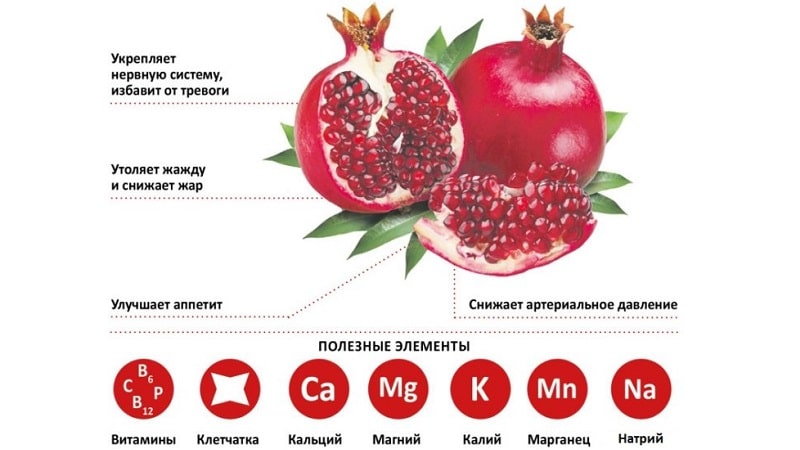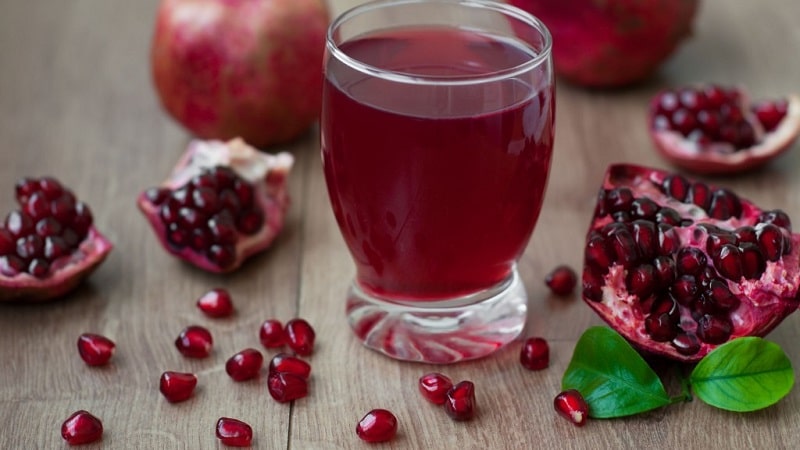What are the benefits of pomegranate for a woman’s body?
Throughout the year, you can find a healthy fruit on store shelves - pomegranate. It is the fruit of a tree or shrub about 4-5 m in height with long leaves and bright red flowers. Pomegranate is used as a general tonic; it is useful for diseases of the gastrointestinal tract, genitourinary system, colds and coughs.
Chemical composition of pomegranate
The calorie content of the product per 100 g is 72 kcal.
BJU per 100 g:
- carbohydrates - 14.5 g;
- fats - 0.6 g;
- proteins - 0.7 g.
IN grenade contains micro- and macroelements (calcium, potassium, iron, phosphorus), vitamins B, PP, E, K, C, disaccharides, fatty acids, monosaccharides, organic acids, dietary fiber, tannins, phytoncides.
Interesting fact! The fruit began to be valued back in Ancient Greece, when it was believed that the fruit was filled with the blood of Dionysus himself and symbolized vitality.
The benefits and harms of pomegranate for a woman’s body
Not only the seeds and pulp bring benefits, but also the peel, tree bark and flowers.

Benefits of fruits:
- Antibacterial, anti-inflammatory and analgesic properties help relieve sore throat pain. Pomegranate is effective against coughs and colds, and restores the body's strength when exhausted.
- Antioxidant substances prevent the development of breast cancer.
- Ascorbic acid is a natural antioxidant that promotes collagen production and improves skin and hair condition.
- Tannins prevent inflammatory processes and suppress the pathological flora of the gastrointestinal tract (staphylococci, salmonella).
- The product increases hemoglobin levels. Anthocyanins help saturate the blood with oxygen.
- Potassium thins the blood and prevents blood clots.
At eating fruit in large quantities can cause harm to health: exacerbation of chronic gastrointestinal diseases.
What are the benefits for various diseases
The main properties of vitamins contained in pomegranate:
- Folic acid has an antianemic effect and is involved in hematopoiesis.
- Vitamin E protects cells from aging processes and helps normalize the menstrual cycle.
- Nicotinic acid has a vasodilating effect and normalizes heart function.
- Retinol helps cope with immune diseases and is used to treat skin diseases.
Pomegranate is rich in polyphenols with high antioxidant activity. It reduces pressure in hypertension, cleanses the walls of blood vessels from seals.
When consumed daily, the juice may improve long-term memory in middle-aged and older adults.
Due to its diuretic and antiseptic properties, the fruit is suitable for auxiliary treatment and prevention of cystitis and other diseases of the genitourinary system. The fruit has choleretic and soothing properties.
Oil pomegranate seeds contains phytoestrogens, may be useful for treating menopausal symptoms, and the juice, enriched with a probiotic, can improve symptoms of polycystic ovary syndrome.
Reference. A decoction of the flowers of the plant is used as a hemostatic agent for wounds and bruises.
Peel and the fruits are used for poisoning and diarrhea. The juice is useful for treating asthma, anemia, and strengthening the body's protective functions.

Contraindications
There are certain restrictions that are important to observe:
- Due to its high acid content, pomegranate should not be consumed by people who suffer from stomach ulcers and gastritis. It is better to dilute the juice with water so as not to damage tooth enamel.
- Fruits are contraindicated for chronic constipation and hemorrhoids.
- The fruit should not be used if you have an individual intolerance, or for children under 3 years of age.
An overdose of pomegranate peel products causes severe intoxication.
Pomegranate for women during pregnancy
The fruit is useful for expectant mothers, but in small quantities and only after the doctor’s approval. The elements in its composition are involved in the formation of the child’s organs, especially bone tissue, respiratory and nervous systems, and mucous membranes.
During pregnancy, many women suffer from iron deficiency anemia. Pomegranate helps prevent its development and replenishes iron deficiency.
When breastfeeding
During lactation, the fruit is allowed to be consumed only with the approval of a pediatrician. The daily norm is no more than 50 g.
Important! The brightness of the fruit indicates the content of a strong allergen. The baby may develop a rash, cough and redness.
The fruit is not recommended for children under 3 years of age.
What are the benefits of fruit for beauty?
Pomegranate improves the condition of hair and skin:
- lightens freckles and acne, reduces wrinkles;
- increases the skin’s ability to protect itself from UV radiation, makes it elastic, preserves collagen;
- strengthens hair follicles;
- improves blood circulation to the scalp.

For weight loss
At correct use fruits reduce weight and improve health. Weight loss occurs due to the normalization of metabolic processes and improved digestion. Pomegranate juice has choleretic and diuretic properties, removes excess fluid from the body.
Use in cooking
Pomegranate adds sophistication to the dish. Its grains are used to prepare fruit and vegetable salads, desserts, and also as decoration. Hot and cold drinks, in particular alcoholic ones, are prepared from the juice. Acetic acid is obtained from the fruit.
How to choose, use and store it correctly
Pomegranates can remain juicy and tasty for a long time, but for this it is important to know how to choose them correctly:
- Ripe fruits have a uniform peel, uniform shade, without spotting.
- The stalk should be dry, with dry sepals.
- The crown is dry and open.
Shelf life of cut pomegranate:
- in the room - no more than 2 days;
- in the refrigerator - up to 5 days;
- in the freezer - months.
It is recommended to store the fruit in mild and warm conditions, since pomegranate lives in the subtropics.
It is recommended to use the product several times a week in the absence of contraindications. The optimal portion is 100–150 g of grains or 100–300 ml of diluted juice per day. It is important to observe moderation so as not to harm digestion.
Conclusion
The beneficial properties of pomegranate have been known since ancient times. It removes inflammation, reduces high blood pressure, prevents the development of cancer, improves the condition of skin and hair, and normalizes metabolism. The fruit is included in many cosmetic products.